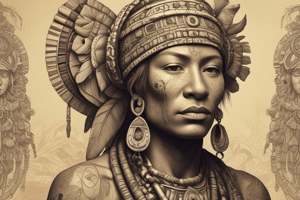Podcast
Questions and Answers
What is culture?
What is culture?
The learned, shared symbols, language, values, and norms that distinguish one group of people from another.
What are co-cultures?
What are co-cultures?
Groups of people who share values, customs, and norms related to mutual interests or characteristics besides their national citizenship.
Ethnocentrism is the acceptance of other cultural groups as equal to one’s own.
Ethnocentrism is the acceptance of other cultural groups as equal to one’s own.
False (B)
Which of the following is NOT a strategy marginalized groups use to interact with members of the dominant culture?
Which of the following is NOT a strategy marginalized groups use to interact with members of the dominant culture?
In which type of culture do people believe their primary responsibility is to themselves?
In which type of culture do people believe their primary responsibility is to themselves?
How do people in collectivistic cultures typically handle disagreements?
How do people in collectivistic cultures typically handle disagreements?
What defines low-context cultures?
What defines low-context cultures?
In high-power distance cultures, how is power viewed?
In high-power distance cultures, how is power viewed?
What characterizes masculine cultures?
What characterizes masculine cultures?
What is the monochronic view of time?
What is the monochronic view of time?
Flashcards are hidden until you start studying
Study Notes
Culture
- Refers to the shared values, beliefs, customs, and symbols that distinguish one group from another.
- Learned through interactions and social experiences.
- Provides a sense of identity and belonging within a community.
Co-cultures
- Within a larger culture, smaller groups share unique values, customs, and norms based on interests or characteristics.
- Examples include religious groups, ethnic communities, or social groups like gamers or sports fans.
Marginalized Groups
- Groups who experience social exclusion or discrimination.
- Often feel like outsiders in dominant culture.
- Strategies for interacting with the dominant culture:
- Assimilation: Trying to fit in by adopting the dominant culture's norms.
- Accommodation: Maintaining their cultural identity while building relationships with the dominant culture.
- Separation: Resisting interaction with the dominant culture.
Communicating with Cultural Awareness
- Understanding the differences in behavior and thinking across cultures is crucial for effective communication.
- Questioning cultural assumptions can improve one's communication competence.
Ethnocentrism
- Viewing one's culture as superior to others.
- Can lead to prejudice and discrimination.
Cultural Relativism
- Accepting other cultures as equal to one's own.
- Promotes understanding and appreciation of diversity.
Cultural Differences
Individualism and Collectivism
- Individualistic cultures emphasize personal responsibility and self-reliance.
- Collectivistic cultures prioritize the needs of the group and community.
High- and Low-Context Cultures
- Low-context cultures prioritize direct and explicit communication.
- High-context cultures rely on nonverbal cues and shared understanding.
Low- and High-Power Distance
- High-power distance cultures accept inequality and social hierarchy.
- Low-power distance cultures value equality and fair treatment.
Masculine and Feminine Cultures
- Masculine cultures emphasize achievement, competition, and assertiveness.
- Feminine cultures value relationships, nurturing, and quality of life.
Monochronic and Polychronic Cultures
- Monochronic cultures treat time as a precious resource.
- Polychronic cultures see time as flexible and adaptable.
Studying That Suits You
Use AI to generate personalized quizzes and flashcards to suit your learning preferences.




